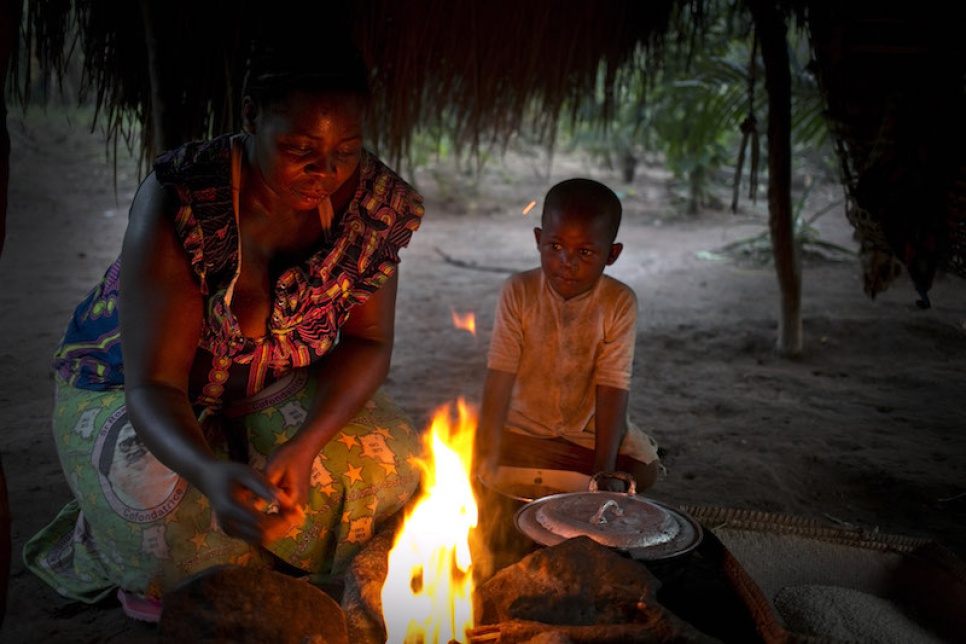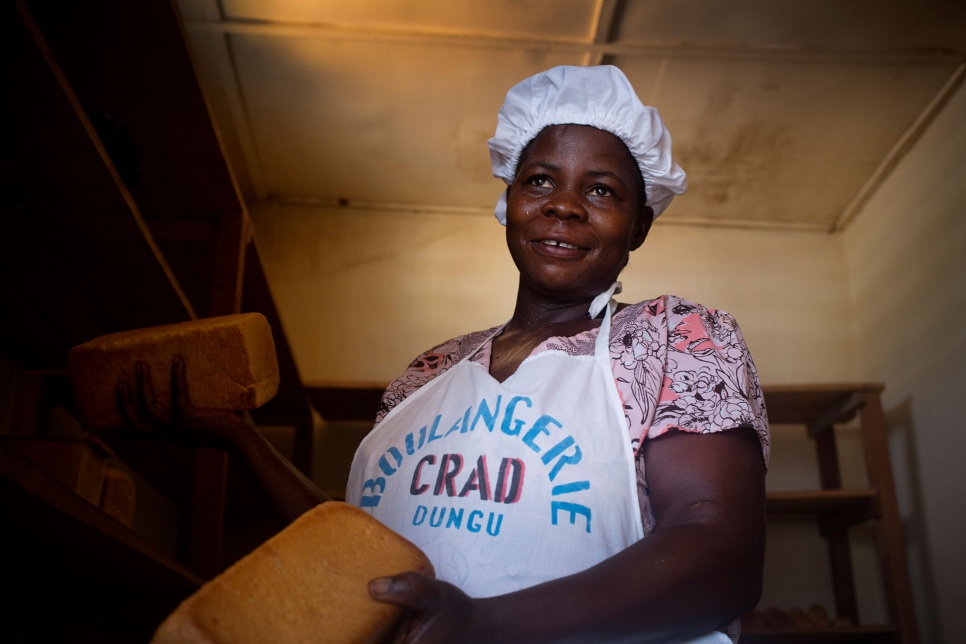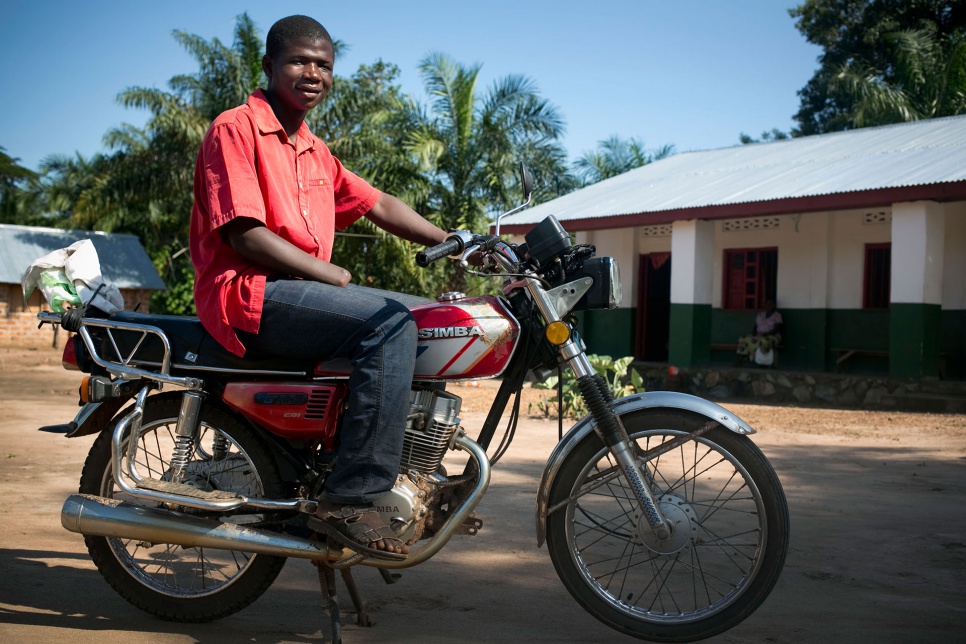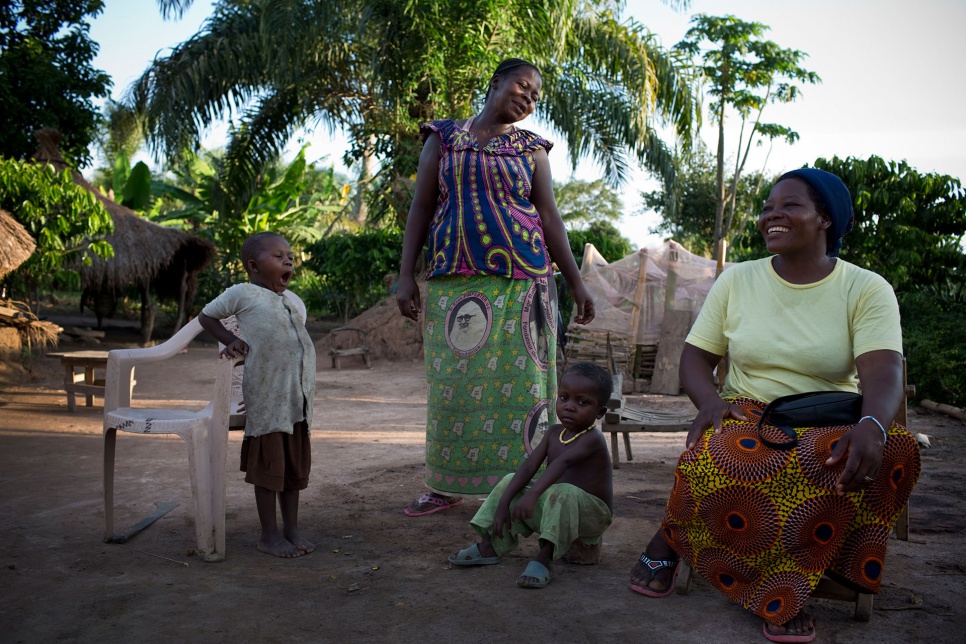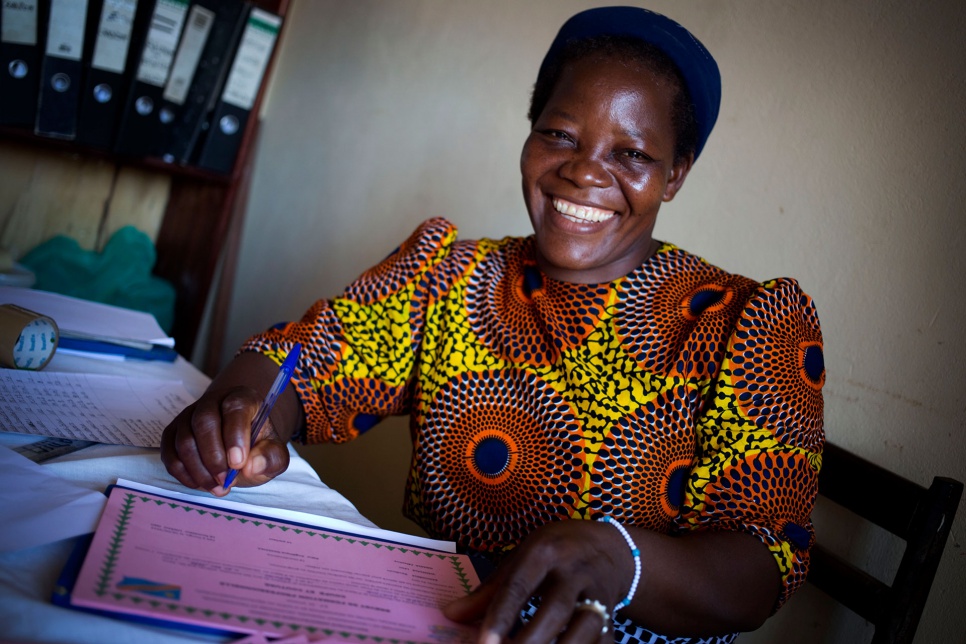The nun and the bakery
In the Democratic Republic of the Congo, survivors of conflict are rebuilding their shattered lives one loaf at a time.
Pascaline holds freshly baked croissants in her apron at Sister Angélique's new bakery.
© UNHCR/Kate Holt
For nearly a decade, the small and dusty town of Dungu, in the Democratic Republic of the Congo, has been under attack. But while many women and girls throughout the region have been kidnapped and terrorised by the Lord's Resistance Army (LRA), others have survived and are now rebuilding their lives.
Sister Angélique Namaika, the 2013 Nansen Refugee Award laureate, has lived in Dungu since 2003. For more than a decade, she has been helping over 2,000 women to overcome their trauma, counter the stigma attached to rape, and learn to live again. With the Nansen prize money, Sister Angélique opened a cooperative bakery on 5 June 2015. I seized the opportunity to go back and see her again.
I've been to Dungu several times in the past five years. During my visits, I have met Sister Angélique and many of the women, girls and boys she has been helping. I have been a witness to their pain, despair and, after some time, hope. This was the first time I saw them really happy. They could not stop telling me how great a difference we made for them, being there from the beginning and continuing to help them recover and rebuild their lives. The smiles on their faces replaced their tears.
These are the stories of Sister Angélique, three women and one young man I met over time in Dungu and whose lives are changing thanks to this promising little business.

Nema, who was kidnapped by the LRA four years ago, sits on her bed with her baby in the shelter provided by Sister Angélique. © UNHCR/Kate Holt
Nema, 18
Nema was kidnapped four years ago, in an attack that killed her father. Her mother had died of an illness a few years earlier. Rescued by the Ugandan army in 2013, Nema tried to rebuild her life in Dungu. But last year she became pregnant, making her struggle even harder.
"I had nowhere to go," she tells me. "The neighbours helped me to go the hospital to give birth to my baby."
Nema had no home, and no family who could support her. So the hospital called Sister Angélique to ask if she could help. Since then, Nema has lived at Sister Angélique's house. Now the mother of a three-week-old baby, she sells bread from the bakery.
"I sell bread to learn how to take care of myself and my baby," she says. "As I am still weak from the birth, I cannot work too much, but after that I will also work in the food catering services. When I lie in my bed at night, I always think about what Sister Angélique told me. When I will be stronger again, I will open a restaurant. And when I think of that, I am happy. I would like to start soon. I am well now. There is nothing that makes me feel bad or hurts."
Pascaline, 43
Pascaline was forced to flee when her village, Gbaga, came under attack in 2010. She walked through the forest for two days before arriving in Dungu. During the attack, three of her 12 children were kidnapped: a 12-year-old daughter, a 14-year-old son and a 16-year-old son. The girl managed to escape soon after, but the two boys remained in captivity for several years. In 2013, one of them, then 18, managed to escape and told his mother that his brother had been killed.
Now Pascaline works at Sister Angélique's bakery, as well as in the nearby fields. The income means she can finally take care of her family.
"The bakery helped me a lot, especially to pay for the school fees for my children and also to pay for the hospital," says Pascaline. "When my husband fell ill, there was no chance he could survive, and it is the bakery that saved him. He had hypertension, diabetes and hernia. It is thanks to the bakery that we were able to buy the medicine."
Pascaline dreams of buying a new piece of land by selling the rice she and her family have harvested. She also has high hopes for her children.
"I want my children to study," she says. "I always think of their education because I failed to get a diploma. My dad had money but, as I was the only daughter, I had to take care of my brothers and sisters. If I had studied I could do better in life today. In the evenings, my daughters are telling me what they would like to do later. I have to do everything I can to encourage them to go far."
Innocent, 19
Innocent, Pascaline's son, was kidnapped in 2010 and spent three years in captivity in the bush. He managed to escape during an offensive by Congolese troops in 2013, but was shot in the right hand, which had to be amputated. After receiving medical care, he went back to school in Dungu, but soon gave up as he was not able to write. It is thanks to his mother, who works in the bakery and the fields, that he was able to survive before he found his current job.
"I am back since 2013, but the problem is that I have only one hand," Innocent tells me. "I wanted to go to school but I could not write and it was a problem. I tried to find something else I could do. I started driving a motorbike. I transport people and goods and this is how I get by. I thought that driving a moto could be a solution as I liked motorbikes before I was kidnapped."
"With one hand, it is the only thing I can do," he continues. "I found a way to change the clutch from the right to the left side of the motorbike's handlebar."
Innocent transports people and goods from Dungu to Niangara using a motorbike that belongs to his uncle. But, although he has learned to drive with one hand, it is still a problem.
"At first when I transport people they have doubts, but after a few metres when they see how I drive, they trust me. But I have problems with the police. When they see me they say that I need a prosthesis. I would like to find one. It would help me to be more stable on the moto."

Marie cooks an evening meal at Sister Angélique's home in Dungu, in eastern Democratic Republic of the Congo. © UNHCR/Kate Holt
Marie, 20
Marie was just 14 years old when she was captured by the LRA in her village of Duru. Held captive for three years, she eventually won her release. Marie met Sister Angélique at a site for internally displaced people in Nyanzava, joining the nun's literacy classes in 2012 and later taking part in cooking and sewing sessions.
Thanks to her work at the bakery, Marie is now able to feed her family. Last year, she met someone, and together they have three-month-old baby girl.
"I called my daughter Angélique, because Sister Angélique taught me so many things," says Marie, with a smile. "She taught me how to work and the importance of work."
The family also grow crops, and Marie's new husband is building them a house with bricks. "He is building a big house as Sister Angélique told him to do," Marie says.
"Now I have everything," she continues. "There is nothing else I want. When I finish the work in the fields, I go home and I continue working [at the bakery], baking donuts to earn money to take care of my family. If someone is sick, I have money to take them to the hospital. There is nothing else I want. I want to stay with my husband and continue our life together. I love him."
Sister Angélique, 48
In 2013, Sister Angélique, a 48-year-old Roman Catholic nun, was presented with the Nansen Refugee Award for her exceptional courage and support for survivors of brutal violence in the Democratic Republic of Congo. Using the prize money, she has now opened a cooperative bakery that allows her to assist more women displaced by fighting. She also bought a 20-hectare field, where 80 women have found work and harvested 30 tons of rice this year.
Sister Angélique has also established an orphanage, a primary school, a health clinic that offers free care to children, and organized sewing classes with a professional trainer.
"I don't cry anymore like I used to cry before," she tells me. "Before, I was not able to buy milk for the children because I had no money. Now when I go to the shops, they give me the milk even if I can't pay immediately, because they know I will pay. Now I have only tears of joy. Before, it was even difficult for us to eat. Now with the fields, we eat whenever we are hungry."
"The community of Dungu is so happy," she continues, with a smile. "Men say that it is thanks to these projects that they can take their wife to the maternity ward to give birth. They tell me that I cannot imagine how many people I have helped here in Dungu. And I say that it is UNHCR, through its award, that has created all of that. It comes from you."
Now, it is not just orphaned girls or victims of the LRA who come to Angélique for help. Others in the community are coming as well. "Their parents sent them to me, asking me to train them," Sister Angélique explains. "Thanks to that, I have the hope that even if I go one day, there will be others to continue my job and take over."

